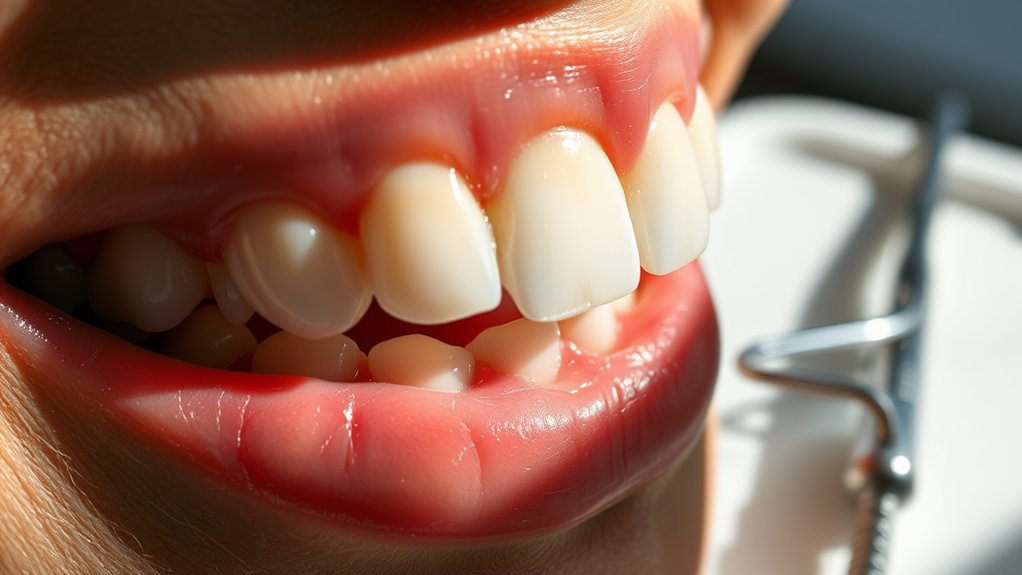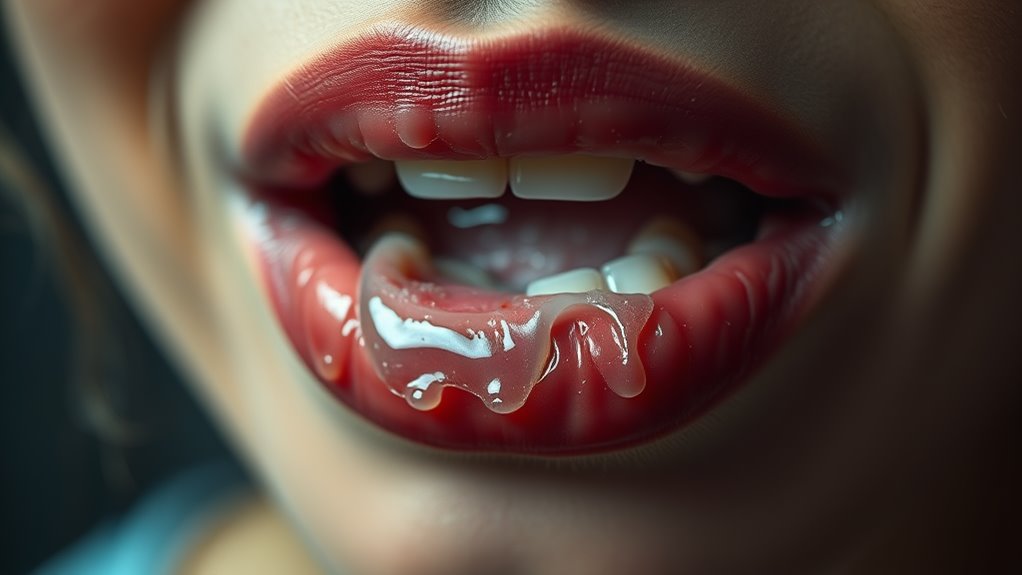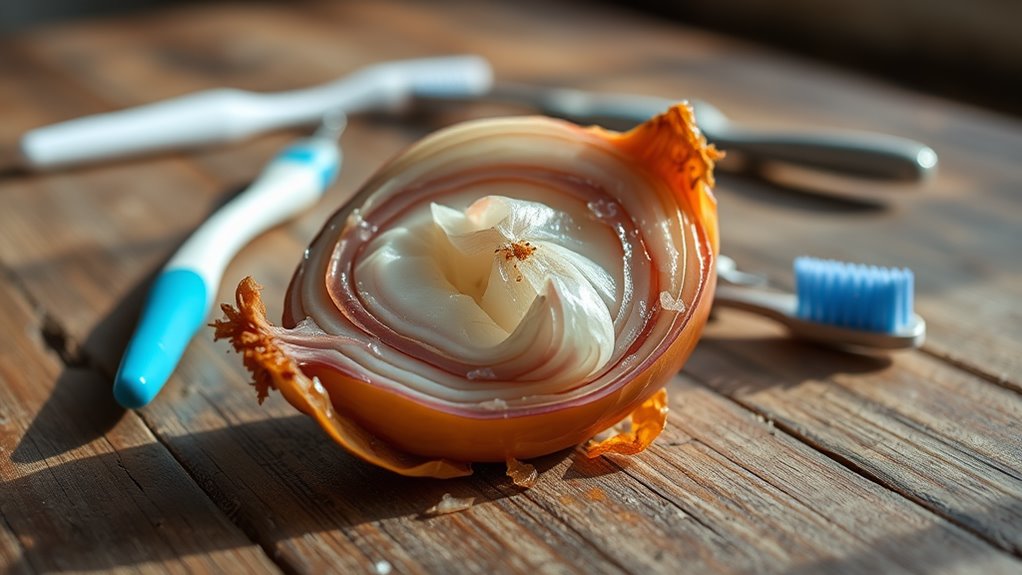How Stress Impacts Your Teeth and Gums
Stress affects your body, your mind, and surprisingly, your oral health. When stress levels rise, hormonal changes occur, leading to issues like gum inflammation and dry mouth. You might notice your oral hygiene slipping as anxiety takes over, resulting in potentially harmful habits. Understanding this connection is crucial, as managing stress can significantly influence your dental health. But are you aware of how these stressors manifest in your mouth?
Key Takeaways
- Stress releases cortisol, causing gum inflammation and a weakened immune response, which increases susceptibility to dental issues.
- Neglected oral hygiene during stressful times leads to plaque buildup, cavities, and heightened gum disease risk.
- Chronic stress reduces saliva production, resulting in dry mouth and greater chances for cavity development.
- Teeth grinding (bruxism) induced by stress causes jaw tension, headaches, and potential tooth wear.
- Regular dental visits are crucial for early detection and management of stress-related oral health problems.
The Connection Between Stress and Oral Health
While you may not realize it, stress can significantly impact your oral health. When you’re overwhelmed, your body releases cortisol, which can lead to inflammation in your gums and an increased risk of periodontal disease. High stress levels may also cause you to neglect oral hygiene, leading to plaque buildup and cavities. Moreover, stress often results in unhealthy habits like smoking or excessive caffeine consumption, further harming your teeth and gums. Ignoring oral hygiene during stressful times can exacerbate not only your dental health but also your cognitive abilities.
Teeth Grinding and Jaw Tension
Teeth grinding, often triggered by stress and anxiety, can lead to significant jaw tension and discomfort. You might experience symptoms like headaches or facial soreness as a result of this habit. Understanding the causes and exploring prevention and treatment options is essential for maintaining your oral health and overall well-being. In fact, bruxism can lead to micro-fractures in dental enamel, exacerbating dental issues if left unaddressed.
Causes of Teeth Grinding
When you experience stress, it’s not uncommon for you to unconsciously grind your teeth or clench your jaw. This phenomenon, known as bruxism, often stems from heightened anxiety or emotional tension.
Other causes may include sleep disorders, misaligned teeth, or excessive alcohol and caffeine consumption. Poor coping mechanisms can also trigger teeth grinding, as you mightn’t realize you’re tense during challenging situations.
Jaw tension builds up as you tighten muscles in response to stress, contributing to the grinding. Recognizing these causes is crucial to addressing the issue and preserving your dental health before it leads to more serious concerns.
Symptoms of Jaw Tension
Noticing symptoms of jaw tension can be crucial for addressing the underlying issue of bruxism. You might experience various signs indicating jaw stress, prompting you to take action.
Look for these common symptoms:
- Persistent headaches, especially around your temples
- Tenderness in your jaw muscles, particularly after meals
- A clicking or popping sound when opening or closing your mouth
Recognizing these symptoms early can help you manage jaw tension effectively.
Ignoring them might lead to further complications, such as damaged teeth or chronic pain, making it essential to stay vigilant about your oral health.
Prevention and Treatment Options
To effectively manage teeth grinding and jaw tension, it’s essential to explore both preventive measures and treatment options.
First, practicing stress-reducing techniques like yoga, meditation, or deep breathing can significantly help. Additionally, consider wearing a custom dental guard at night to protect your teeth.
Regular jaw exercises can alleviate tension and improve flexibility. If symptoms persist, consult your dentist or healthcare provider for professional advice. They may recommend physical therapy or medications to help ease symptoms.
Addressing underlying stressors in your life is crucial—staying proactive can keep your teeth and gums healthy and reduce the effects of stress.
Gum Disease and Inflammation
When you’re stressed, your body reacts by triggering an inflammatory response that can significantly affect your gum health. This inflammation can lead to gum disease, causing symptoms like redness and swelling. If left unchecked, the condition can worsen and lead to serious dental issues, making stress management crucial for maintaining healthy gums. Additionally, untreated gum disease can contribute to heart health problems, as harmful bacteria may enter the bloodstream and increase inflammation in the body.
Stress-Induced Inflammation Response
Stress can trigger a powerful inflammatory response in your body, which significantly affects your oral health. When you’re stressed, your immune system may react by increasing inflammation, putting you at risk for gum disease. This inflammation can lead to discomfort and further complications if not addressed.
-
Increased blood flow to the gums can cause swelling.
-
Stress hormones may worsen the inflammatory response.
-
Chronic inflammation can damage connective tissues and bone.
Being aware of these effects can help you manage stress, ultimately protecting your gums and maintaining a healthier smile.
Prioritize stress management techniques to combat this harmful cycle.
Impact on Gum Health
While many people overlook the connection between stress and gum health, it’s crucial to understand how they intertwine. Stress can lead to gum disease and inflammation, affecting your overall oral health. High stress levels increase hormones like cortisol, which may impair your immune response, making it harder for your body to fight off bacteria and inflammation.
| Stress Effects | Consequences |
|---|---|
| Increased cortisol levels | Weakened immune response |
| Poor oral hygiene habits | Higher risk of gum disease |
| Bruxism (teeth grinding) | Worn-down enamel, gum recession |
Recognizing these effects can help you maintain healthier gums.
Increased Risk of Cavities
Feeling overwhelmed may not only take a toll on your mental health but can also raise your risk of cavities.
Stress can lead to hormonal changes that affect your saliva production, which is crucial for neutralizing acids in your mouth. Additionally, it can weaken your immune response, increasing your vulnerability to decay-causing bacteria.
Here are some key factors to consider:
- Stress-induced dietary changes may lead to increased sugar intake.
- The production of cortisol can affect your body’s ability to fight off infections.
- Neglecting oral hygiene due to stress can leave harmful plaque unchecked.
- Research reveals that maintaining oral hygiene helps protect heart health.
Awareness is crucial for maintaining your dental health.
Bad Habits Induced by Stress
The impact of stress on your oral health extends beyond just an increased risk of cavities; it can also lead to the development of bad habits that further jeopardize your teeth and gums.
When stressed, you might find yourself grinding your teeth or clenching your jaw, often without realizing it. These behaviors can wear down enamel, causing sensitivity and pain.
Additionally, stress may trigger unhealthy eating habits, like snacking on sugary foods or neglecting your oral hygiene routine altogether. Over time, these habits can exacerbate dental issues, making it crucial to recognize and address the stressors impacting your daily life. Many individuals may resort to quick fixes, like viral teeth whitening hacks, instead of seeking professional care, which can pose additional risks to dental health.
Managing Stress for Better Dental Health
Finding effective ways to manage stress can significantly enhance your dental health. Reducing stress can prevent habits like teeth grinding and decrease inflammation in your gums.
Here are some strategies to consider:
-
Practice mindfulness and meditation: Incorporating these techniques can help you focus and calm your mind.
-
Engage in physical activities: Regular exercise releases endorphins, aiding in stress reduction.
-
Ensure adequate sleep: Quality sleep can improve your overall health, including your oral health.




